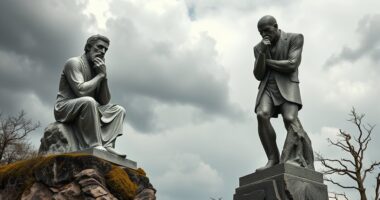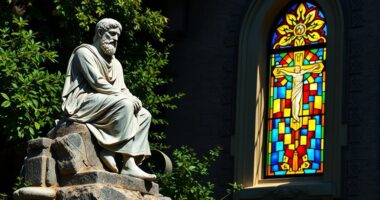Uncovering Hadrian’s wisdom and humanity reveals a leader who balanced strength with self-awareness. His reign shows how philosophy, especially Stoic virtues like resilience, humility, and self-control, guided his decisions and personal growth. Despite his achievements, he struggled with insecurities and personal loss, reminding us even great leaders grapple with flaws. His reflections on mortality and accepting life’s cycles offer timeless lessons on life, leadership, and resilience—if you continue exploring, you’ll uncover even deeper insights.
Key Takeaways
- Hadrian exemplified Stoic virtues like self-control, resilience, and humility, shaping his leadership and personal growth.
- His architectural achievements, such as Hadrian’s Wall, reflect his focus on cultural legacy and defense.
- Hadrian’s reflection on mortality and internal struggles reveal his human vulnerability despite his wisdom.
- Recognizing life’s cycles and mortality helped Hadrian prioritize virtue, stability, and humility in governance.
- His integration of philosophy into daily life fostered resilience, self-awareness, and a balanced approach to leadership.
The Life and Reign of Hadrian: A Historical Overview
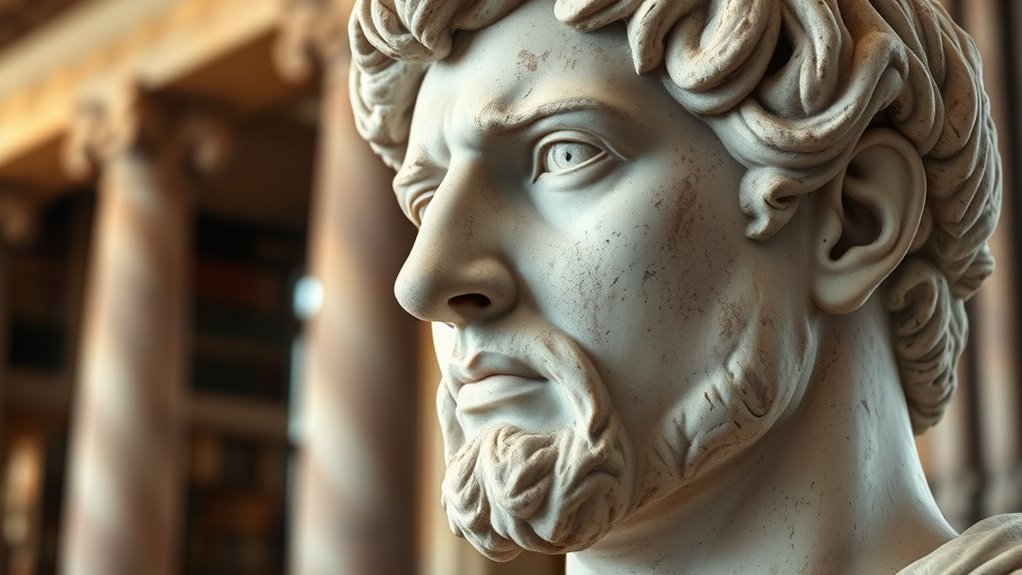
Hadrian’s life and reign stand out as a period of significant transformation for the Roman Empire. You see, his leadership shaped imperial politics through strategic reforms, consolidating power and stabilizing the empire. His architectural achievements, like the famous Hadrian’s Wall, reflect his commitment to defense and cultural legacy. Unlike many rulers, he prioritized peace and stability, balancing military strength with diplomacy. His rule marked a shift towards internal development, emphasizing infrastructure, arts, and urban planning. By understanding his focus on architectural projects and political strategies, you gain insight into how he transformed Rome’s empire into a lasting legacy of strength and sophistication.
Embracing Self-Reflection: The Path to Personal Wisdom
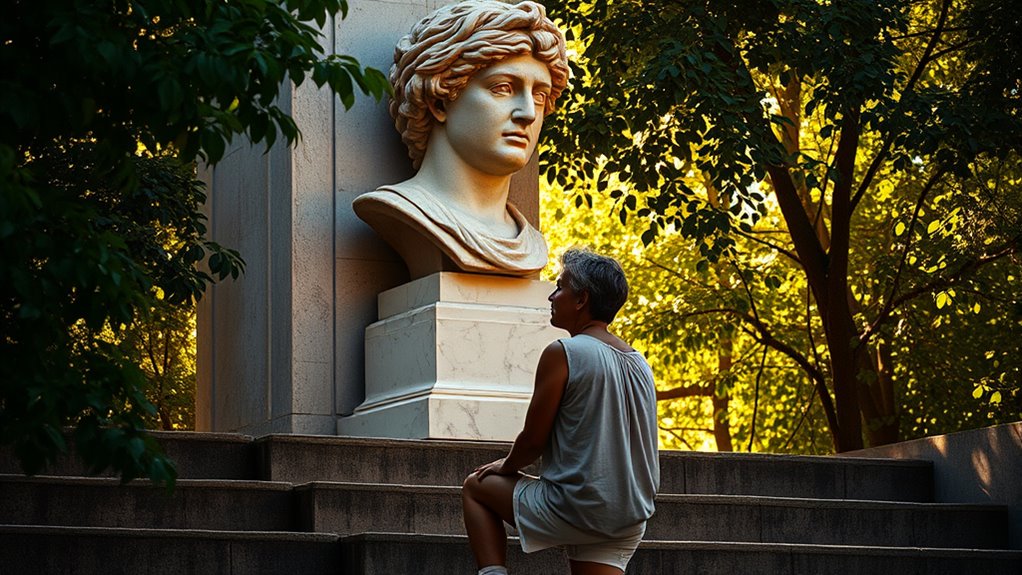
Self-reflection serves as a vital pathway to personal wisdom, allowing you to understand yourself beyond surface appearances. By practicing self-awareness, you uncover your true motivations, strengths, and flaws, which are essential for genuine growth. As Hadrian suggests, evaluating your life and actions helps bring order to chaos and fosters authenticity. Incorporating goal setting into your self-reflection practices can further enhance your personal development journey. Cultivating curiosity about yourself and the world around you can deepen your insights and open new avenues for growth. Personal growth emerges from honest self-examination, making self-reflection an indispensable tool on your journey toward wisdom and a fuller life. Recognizing the power of horsepower in your pursuits can also motivate you to pursue your goals with energy and determination. Additionally, understanding delivery challenges in services like breakfast delivery highlights the importance of efficiency and quality in achieving success. Exploring nutrient retention in vegetable juices can also inspire you to optimize your health practices for better well-being.
The Myth of the Golden Age: Recognizing Life’s Cycles
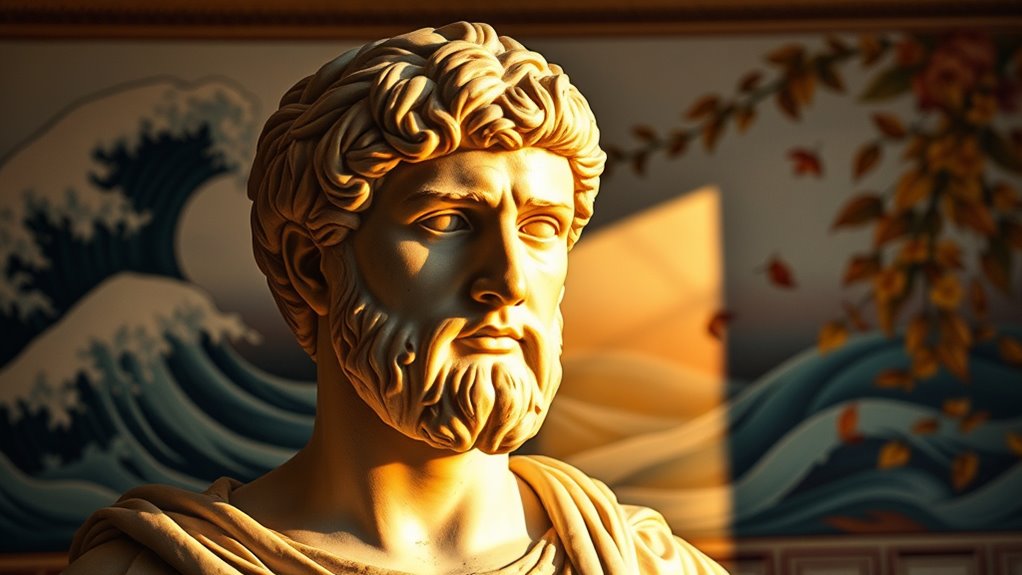
Many believe that history follows a perfect pattern of rise, decline, and renewal, but this idea of a static “Golden Age” can obscure the natural ebb and flow of life. Recognizing eternal cycles helps you see that these ages have mythical origins, rooted in human longing for stability and perfection. Life moves in recurring patterns, with triumphs and failures shaping your journey. Instead of clinging to an idealized golden era, accept that growth and decline are intrinsic parts of existence. Understanding these cycles allows you to embrace change with humility, knowing that every phase has its purpose within the larger rhythm of human experience.
Mortality and the Practice of Memento Mori
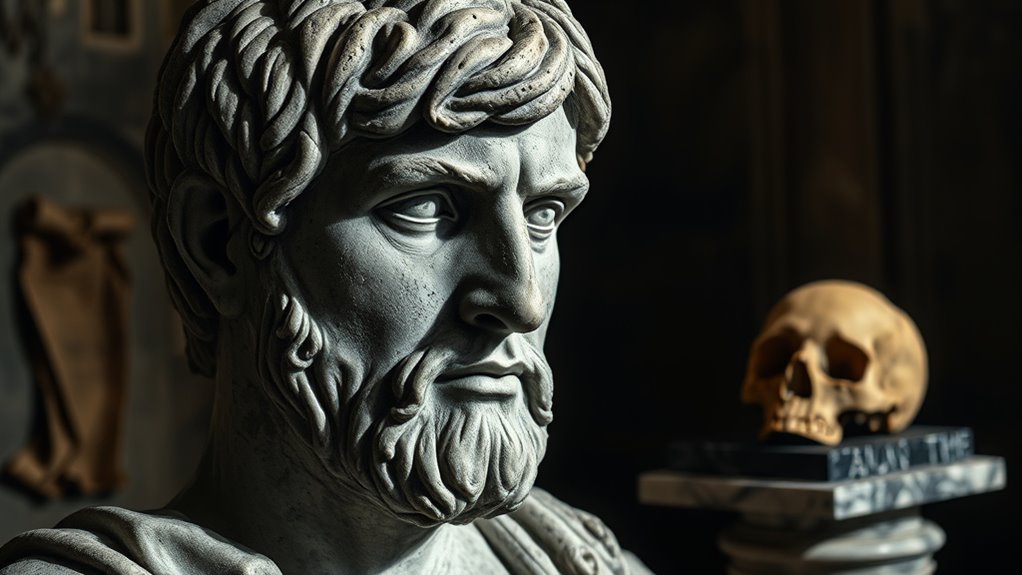
Life’s natural cycles remind you that change and decline are inevitable parts of the human experience. The practice of *memento mori* uses artistic symbolism and cultural memorials to keep mortality at the forefront of your mind. By contemplating death, you gain humility and clarity, inspiring more meaningful living. Cultural memorials serve as timeless reminders of life’s fleeting nature, urging reflection on what truly matters. Embracing mortality isn’t about fear but acceptance, helping you prioritize virtue and self-awareness. Hadrian’s acknowledgment of death underscores the importance of humility and wisdom, guiding you to live fully knowing that mortality unites all human endeavors. Additionally, understanding the history of pinball machines reveals how cultural symbols and entertainment have evolved alongside societal attitudes toward leisure and morality. Recognizing cultural memorials as enduring symbols helps deepen your appreciation for how societies commemorate and reflect on mortality across history. Incorporating goal tracking techniques into your reflective practices can further enhance your ability to live intentionally with awareness of life’s impermanence. Exploring the design and materials of self-watering plant pots demonstrates their innovative approach to sustainable gardening, which can serve as a metaphor for nurturing growth with minimal intervention. Regularly practicing space and organization in your environment can also support a mindful lifestyle aligned with these principles.
Human Flaws and Complexities: Hadrian’s Personal Struggles
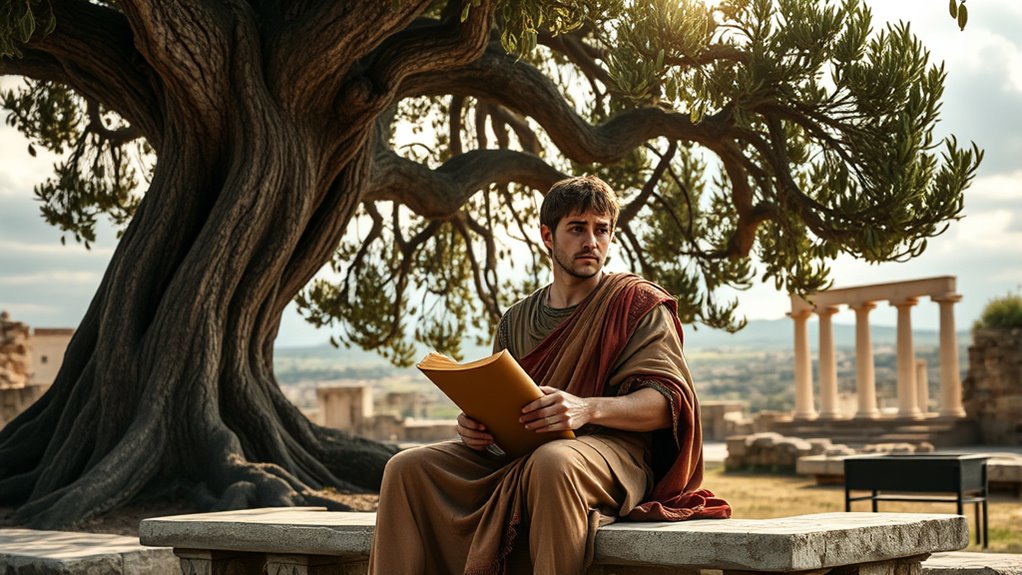
Despite his reputation as a wise and powerful ruler, Hadrian’s personal struggles reveal a deeply human side marked by flaws and internal conflicts. You see, beneath his confident exterior, he grappled with personal insecurities that sometimes undermined his leadership. His vulnerabilities made him prone to temper issues and moments of doubt, especially when facing difficult decisions. Hadrian’s quest for perfection often clashed with his imperfect human nature, exposing his internal battles. These flaws don’t diminish his greatness but remind you that even the strongest leaders are vulnerable, wrestling with internal struggles that shape their actions and legacy. Additionally, understanding the importance of color accuracy in projects can shed light on the ways leaders like Hadrian sought clarity and precision in their visions. Moreover, the ongoing development of AI safety measures emphasizes the need for vigilance against vulnerabilities that could undermine trust in powerful systems. Recognizing the significance of leadership vulnerabilities helps contextualize how personal flaws influence decision-making and legacy.
Love and Loss: The Impact of Antinous on Hadrian’s Life
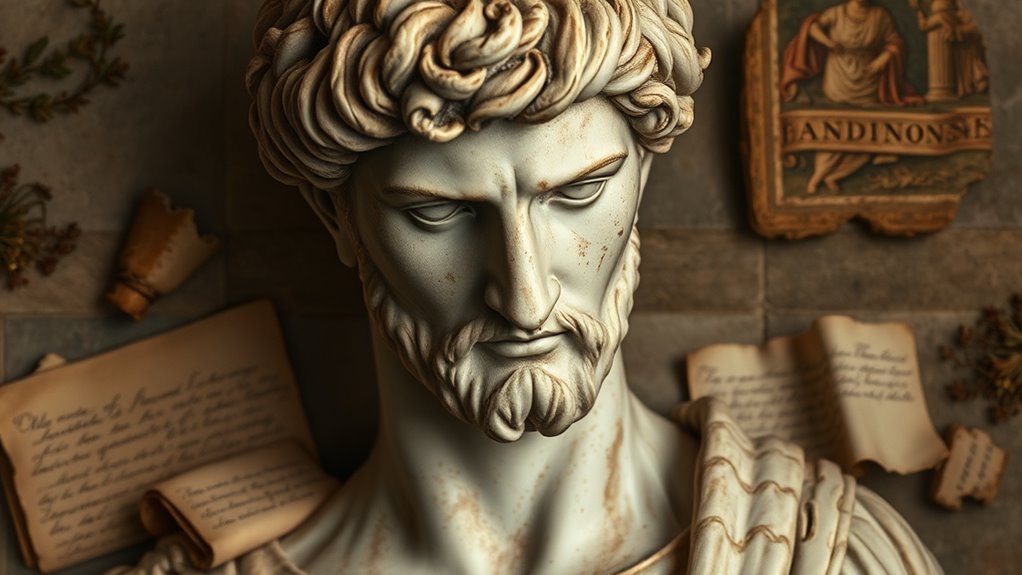
The profound bond between Hadrian and Antinous transformed both their lives, leaving an indelible mark on the emperor’s heart. You feel the weight of romantic grief and the challenge to maintain emotional resilience after Antinous’s tragic death. Hadrian’s deep love for Antinous shaped his view on mortality and devotion. The loss prompted him to honor Antinous with cities and statues, channeling grief into legacy. This heartbreak revealed Hadrian’s human vulnerability, inspiring a profound acceptance of loss and impermanence. Additionally, the emotional impact of Antinous’s death influenced Hadrian’s patronage of anime movies, which often explore themes of love and loss through compelling storytelling. Through it all, Hadrian’s emotional resilience grew, illustrating how love’s pain can forge strength and humility in the face of loss. Recognizing the importance of emotional resilience helped him cope with the enduring grief and find meaning beyond tragedy. Furthermore, his acknowledgment of impermanence fostered a deeper understanding of life’s transient nature, shaping his philosophical outlook and personal growth. Understanding life’s impermanence also encouraged Hadrian to reflect on the fleeting nature of power and life, deepening his philosophical perspective.
Philosophical Insights in the Roman Empire
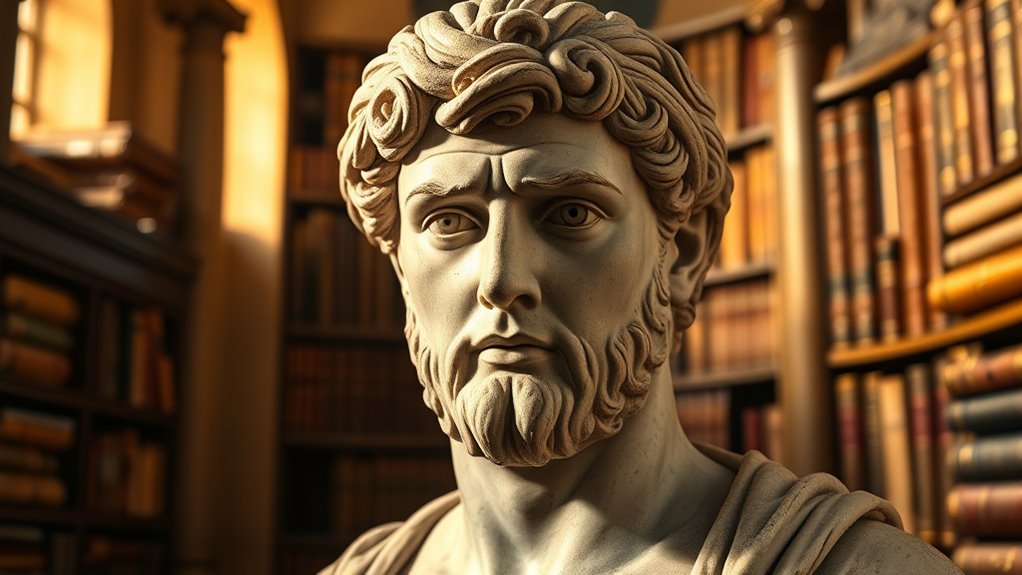
Have you ever wondered how philosophy shaped the values and governance of the Roman Empire? You’ll see that Stoic Virtues like wisdom, courage, justice, and temperance influenced leaders’ decisions, emphasizing self-control and resilience. The Philosophical Paradox, about accepting life’s uncertainties and mortality, challenged Romans to find peace amid chaos. Think of Hadrian’s reflections on mortality and self-awareness—these ideas guided imperial policies and personal conduct. Philosophy wasn’t just theory; it was a practical tool for leadership and personal growth, helping Romans navigate their complex world with humility, strength, and a focus on virtue. Understanding the importance of resilience in Stoic philosophy reveals how Romans developed mental toughness to face adversity and maintain stability in times of crisis.
Applying Ancient Lessons to Modern Life
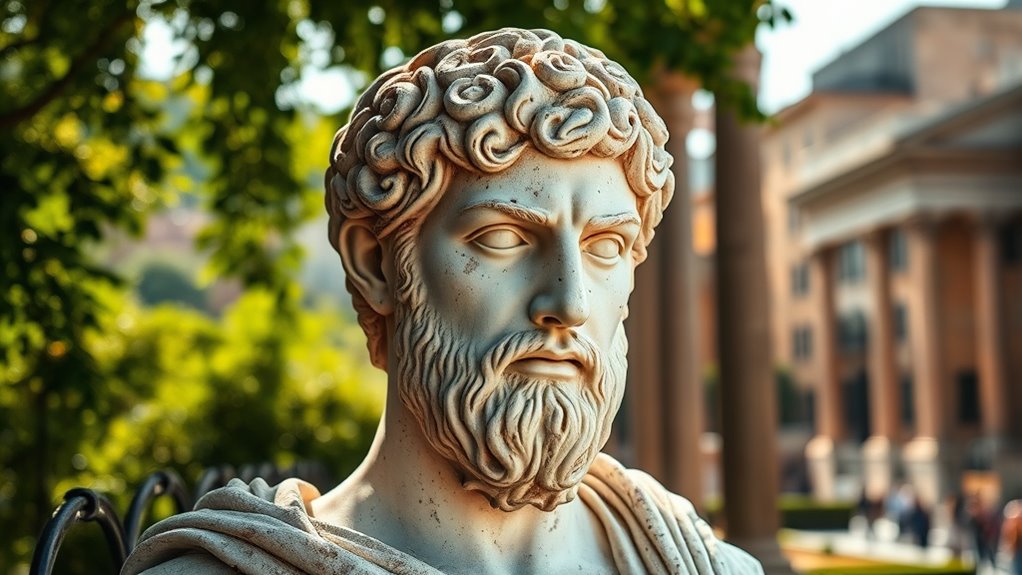
Ancient Stoic principles remain remarkably relevant today, offering practical guidance for maneuvering the complexities of modern life. You can enhance your modern leadership and emotional resilience by applying these lessons.
Ancient Stoic wisdom offers timeless strategies for mastering modern life’s challenges and building resilience.
- Practice self-awareness—reflect regularly to understand your reactions and motivations.
- Embrace mortality—remembering life’s fleeting nature fosters humility and clarity.
- Cultivate patience—accept setbacks as opportunities for growth, strengthening resilience.
- Draw inspiration from cultural narratives in films and stories that reinforce these values and provide perspective.
- Additionally, understanding remote hackathons can foster innovative thinking and adaptability in virtual environments, skills valuable for modern leadership.
- Recognizing the value of attention in creative practice underscores the importance of focused effort and presence in developing personal resilience and leadership skills.
- Maintaining emotional support for oneself and others during challenging times can significantly enhance resilience and foster stronger connections.
- Exploring knitting patterns and other creative activities can serve as mindful practices that bolster emotional well-being and resilience.
Frequently Asked Questions
How Did Hadrian’s Personal Flaws Influence His Leadership Style?
Your question about how Hadrian’s personal flaws influenced his leadership dynamics is insightful. His vulnerabilities, like temper issues and mistreatment of others, sometimes led to impulsive decisions and strained relationships. These flaws made him more human, affecting his ability to connect deeply and trust fully. Recognizing and managing these vulnerabilities shaped his leadership, teaching that self-awareness is essential to balancing personal imperfections with effective governance.
What Specific Teachings From Hadrian’S Reflections Are Most Applicable Today?
Imagine life as a flowing river, and Hadrian’s reflections as guiding stones along its banks. His teachings on Stoic resilience remind you to stay steady amid turbulence, while his emphasis on ethical leadership urges you to lead with integrity, humility, and self-awareness. Applying these timeless principles today, you can navigate chaos with calm resolve, fostering trust and purpose in your actions, much like Hadrian’s enduring legacy.
How Does Yourcenar Portray Hadrian’s Relationship With His Wife Sabina?
You see that Yourcenar portrays Hadrian’s relationship with Sabina as complex, marked by emotional distance and flaws. Despite their marriage, there’s little emphasis on marital intimacy or genuine emotional support. Instead, their union reflects political and personal tensions, highlighting Hadrian’s human imperfections. Yourcenar suggests that even great leaders struggle with authentic connection, reminding you that vulnerability and emotional closeness are essential for meaningful relationships, despite their difficulties.
In What Ways Does Hadrian’S Acceptance of Mortality Inspire Modern Mindfulness?
Imagine life as a fleeting shadow, dancing across the wall of time. Hadrian’s acceptance of mortality teaches you to embrace mindful acceptance, viewing death not as an end but as a natural part of the journey. This mortality awareness deepens your appreciation for each moment, encouraging patience and humility. By recognizing life’s impermanence, you learn to live fully, with clarity and grace, knowing that every breath is precious in this fleeting dance.
How Did Hadrian’S Philosophical Outlook Shape His Approach to Empire Management?
You see that Hadrian’s philosophical pragmatism influenced his empire management by emphasizing ethical governance rooted in self-awareness and balance. He prioritized stability, reform, and diplomacy over conquest, aligning his policies with his reflective outlook. By applying philosophical principles, he sought to create a just, resilient empire that valued human dignity and order, demonstrating how a leader’s inner wisdom directs effective, ethical leadership.
Conclusion
As you journey through Hadrian’s world, remember that beneath the imperial crown lies a human heart, fragile yet resilient. Like a steady lighthouse guiding ships through storms, his wisdom illuminates your path amid chaos and change. Embrace your own shadows and fleeting moments, knowing they’re part of life’s intricate tapestry. By reflecting on his humanity, you discover your inner strength—an eternal flame that keeps your spirit alive through every night and dawn.



